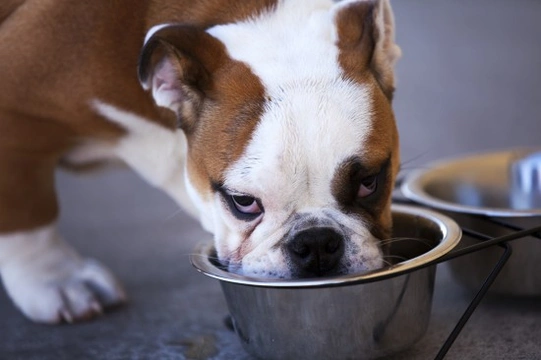
What is Polydipsia in Dogs?
If you notice your dog is drinking a lot more than usual it could be there is a serious underlying health issue which needs to be diagnosed as early as possible. A dog's normal daily intake of water should be 20 to 70 ml/kg of body weight. However, dogs will drink more if they have been out for a walk or been running around all of which will have a bearing on just how much they drink. The rule of thumb is that if your dog suddenly starts drinking more than 100 ml per kg per day and do so regularly, there might be something medically wrong with them and they should be taken for a visit to the vet.
The Reasons Why Your Pet Might be Drinking Excessively?
As in all living things, the balance of water in a dog's body is regulated by their water intake and the amount of water they loose when they urinate. A healthy dog's pituitary gland releases an anti-diuretic hormone and it is this hormone that tells the kidneys they need to conserve water whilst making more concentrated urine. This occurs when a dog does not drink enough or when they loose too much water for whatever reason. At the same time, the brain's thirst centre is stimulated and as a result this encourages a dog to drink more water. A dog will therefore drink more if the following occurs:
- The kidneys fail to respond to the anti-diuretic hormone (ADH)
- ADH fails to be released or produced
- The part of the brain that stimulates thirst works overtime promoting the need to drink (primary polydipsia)
When kidney function is damaged due to liver failure, an infection of the liver, diabetes mellitus, pyometra, an over-active adrenal gland, certain intoxications, over active active thyroid glands and high blood calcium, it can cause them to fail to respond to the all important anti-diuretic hormone which then causes a dog to drink excessively.
Brain Damage
If a dog has suffered any sort of brain injury, trauma, cancer in the form of a tumour or infection, this may well result in the brain not releasing or producing ADH. However, some animals are actually born with an ADH defect. The actually reason why polydipsia develops in dogs is not really known but it is believed to be associated with gastrointestinal diseases as well as diseases of the the urinary tract.
Diagnosing the Condition
When it comes to diagnosing this condition, a vet would want to carry out blood and urine tests which will identify if there is problem with a dog's kidney function. Once the results of these tests are known and having taken a close look at the medical history of a dog, the vet might want to take an ultrasound of the kidneys, liver as well as adrenal glands and then do a urine analysis to investigate hormonal function.
A vet would also want to find out if the kidneys are indeed able to concentrate urine as well as respond to ADH which they typically do by depriving a dog of water. If the result comes back proving the kidneys are not able to do this, they will administer a synthetic ADH and then measure the concentration of urine once again to establish if the underlying cause is due to the kidneys, a urinary disease or a gastrointestinal tract disease before recommending a treatment.
Treatments for Polydipsia
Treatments for this condition vary and depend on the underlying causes. If the condition develops due to chronic kidney failure, a dog would be given free access to water as part of their much needed treatment because this needs to support kidney function all the time ensuring the dog's quality of life is maintained.
The Prognosis
Depending on the diagnosis, the prognosis for dogs suffering from this condition really does vary from extremely good to very poor. In certain cases, the earlier the condition is diagnosed the better the chances are of a dog recovering. This is why if you notice your dog is drinking excessively, it is really important to get them to the vet so they can carry out a thorough examination and take the necessary blood and urine tests.
Conclusion
Energetic or hyper active dogs will drink more than dogs that tend to be a little more sedate. Often once a dog has eaten, they will drink more water and if they come back from a walk will typically go straight to their water bowl. However, if you notice your pet is drinking more than usual and that you are filling up their water bowls constantly throughout the day, there could a serious underlying medical reason why they are and this needs to be investigated by your vet as soon as possible. The vet would be able to make a correct diagnosis and then recommend the right type of treatment to make your dog more comfortable and back on the road to recovery.



